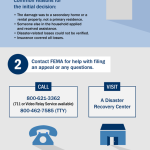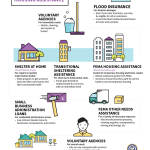TALLAHASSEE, Fla. – The disaster recovery centers operated by the Florida Division of Emergency Management and the Federal Emergency Management Agency in Citrus, Dixie, Hernando and Leon counties will close on Thursday, October 27, at 6 p.m.
The centers are located at:
Citrus County
West Citrus Center
1540 N. Meadowcrest Blvd.
Crystal River, FL 34429
Dixie County
Lumber Yard Parking Lot
63 NE 132nd Ave.
Cross City, FL 32628
Hernando County
Westside Government Center
7405 Forest Oaks Blvd.
Spring Hill, FL 34607
Leon County
Leroy Collins Library
200 W. Park Ave,
Tallahassee, FL 32301
Disaster Survivor Assistance teams will continue to canvass Hurricane Hermine affected counties until Saturday, October 29, with information on available assistance. They can answer questions and support you in on-the-spot registration.
Those who have not yet registered can do so by visiting www.DisasterAssistance.gov.
They may also access many of the services available at centers by calling the FEMA helpline at 800-621-3362 or TTY 800-462-7585. Those who use 711/Video Relay Services (VRS) can call 800-621-3362. Lines are open 7 a.m. to 10 p.m. seven days a week until further notice.
Survivors may use the helpline to stay informed. They can:
- Ask questions about FEMA determination letters.
- Learn how to appeal FEMA determination letters. All applicants may appeal.
- Inquire about the status of a registration.
- Provide change of address, telephone and bank account numbers and insurance information to avoid disaster assistance processing delays.
- Receive information about FEMA home inspections.
- Get other questions answered about federal disaster assistance.
Applicants should have their nine-digit FEMA registration number and zip code on hand and available if they want to discuss their application.
For information on Florida’s disaster recovery, visit www.fema.gov/disaster/4280, https://twitter.com/femaregion4, www.facebook.com/FEMA, and www.fema.gov/blog.
Credit –






